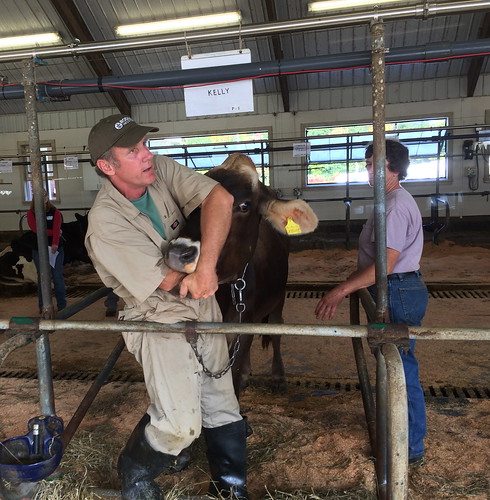
Last month, I had the pleasure of attending the Northeast Organic Dairy Producers Alliance (NODPA) Field Days at Stonewall Farm in Keene, New Hampshire. The field days combine many activities for attending farmers, giving them the opportunity to learn from each other, speak with experts in the organic field, catch up with old friends and make some new friends too.
As Deputy Administrator for USDA’s National Organic Program, part of the Agricultural Marketing Service, I participated in a panel discussion on the future of organic certification with Dr. Jean Richardson, Chair of the National Organic Standards Board (NOSB), and Henry Perkins, President of the Maine Organic Milk Producers. I also had the opportunity to present information about the National Organic Program, including USDA’s programs that support organic agriculture, sound and sensible certification, the National Organic Standards Board and the revised sunset process.
Half of this year’s program focused on improving the farm’s financial bottom line, while the other half focused on organic dairy’s bottom line – the cows. The program was packed with compelling, practical workshops; a tour of the diverse enterprises at Stonewall Farm; a large trade show; and plenty of time to network with fellow farmers.
One highlight was the hands-on workshop with veterinarians Dr. Hue Karreman and Dr. Cindy Lankenau. The vets let attendees perform a physical exam and some emergency techniques on selected cows. Dr. Lankenau demonstrated acupuncture and chiropractic care on older cows while discussing her use of herbal medicine.
There was an excellent panel discussion on grass-fed dairy production. Peter Miller, a producer representative from Organic Valley, an organic dairy co-op, discussed the company’s launch of "Grassmilk" in response to consumer demand. Sarah Flack, a grazing consultant from Vermont, shared her preliminary research on how farms with grass-fed herds are doing. Cliff Haubacker, a Pennsylvania producer of grass fed milk, talked about his experiences using this style of production.
It was an action packed few days, and we enjoyed discussions on the organic certification requirements for organic dairy. Organic dairy cattle are fed 100 percent certified organic feed, raised without antibiotics and added growth hormones and managed in a way that accommodates the health and natural behavior of the animals. Additionally, all organic ruminant livestock – including dairy cattle – must have access to certified organic pasture for the entire grazing season, and their diets must contain at least 30 percent dry matter (on average) from certified organic pasture. The rest of its diet must also be certified organic. Organic livestock production and pasture-based systems provide many benefits to the environment and the animal’s health.
NODPA was founded in February 2001 and is the largest grass-roots organization of organic dairy producers in the country. Its mission is to enable organic dairy family farmers across an extensive area to have informed discussion about matters critical to the well-being of the organic dairy industry as a whole.
"The NODPA Field Days and Annual Meeting rely on the generosity and commitment of national and regional leaders of the organic community who willing share their knowledge, ideas, and business experience with organic dairy producers at our annual event which is hosted at a different location each year to make it as easy as possible for producers and their families to attend," said Ed Maltby, NODPA Executive Director.
The NODPA Field Days gave organic dairy farmers an excellent opportunity to learn, share their successes and support the continued growth and well-being of the organic dairy sector. More information about NODPA is available at www.nopda.com.
